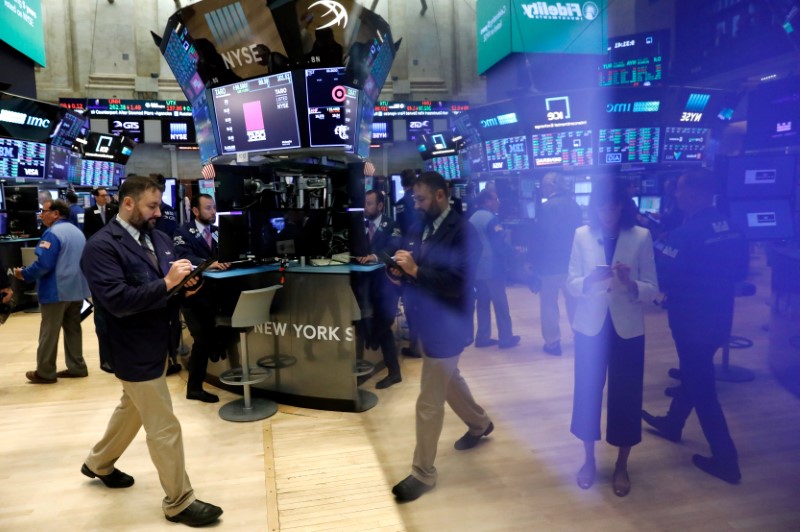* S&P 500 futures turn down going into Asia opening
* Investors like manufacturing recovery
By David Henry
NEW YORK, June 1 (Reuters) - Asian stocks were set to come under pressure on Tuesday following a dip in Wall Street futures as U.S. President Donald Trump vowed to use force to end violent protests in American cities, souring a previously upbeat market mood.
E-mini futures for the S&P 500 EScv1 fell 0.38% and
{{178|Japan's NiNikkei 225 futures NKc1 lost 0.34%. Australian S&P/ASX 200 futures YAPcm1 rose 0.15% in early trading.
The early indications came after major U.S. stock indexes closed with gains of about 0.5% and continued to hover near three-month highs. Trump spoke in the Rose Garden of the White House on Monday, live television images showed police firing tear gas to dispel demonstrators in Lafayette Park, across the street. American consumers were reluctant to come out of their COVID-19 lockdown cocoon fearing a secondary spreader, it's unlikely they will feel any safer with military Humvees rolling down Pennsylvania Avenue," Stephen Innes, Chief Global Markets Strategist at AxiCorp, wrote in a note to clients.
As Asian markets prepared to open, dozens of cities across the United States were under curfews with the National Guard deployed in 23 states and Washington, D.C.
The curfews followed protests over the death of George Floyd, a 46-year-old African American who died in Minneapolis after being pinned beneath a white police officer's knee for nearly nine minutes.
The dollar index =USD fell 0.4%, as risk appetite had increased on optimism that the worst of the global economic downturn caused by the coronavirus may be in the past. biggest concern for bond markets was growing U.S. government debt with the benchmark 10-year Treasury notes US10YT=RR yield rising to 0.677% from 0.644% on Friday. investors are saying (the protests) aren't going to destroy the economy," said Paul Nolte, portfolio manager at Kingsview Asset Management in Chicago. "It's a roadblock, but it's not as big as a pandemic."
The protests were largely peaceful on Sunday but turned violent in the evening. On Monday U.S. President Donald Trump urged state governors to crack down on protests over racial inequality that have engulfed the nation's major cities, as officials extended curfews to prevent a seventh night of looting and vandalism. were cheered by U.S. manufacturing activity turning up slightly from an 11-year low in May. The report was the strongest sign yet that the worst of the economic downturn had passed as businesses reopened, though the recovery from the COVID-19 crisis could take years because of high unemployment. in the euro zone, the IHS Markit's Manufacturing Purchasing Managers' Index recovered slightly in May from April's record low, although factory activity still contracted heavily. futures steadied on Monday despite U.S.-China trade tensions with Brent LCOc1 up 1.3% to settle at $38.32 a barrel and U.S. crude CLc1 slipping 5 cents to $35.44 a barrel. gold XAU= added 0.8% to $1,739.75 an ounce. U.S. gold futures GCc1 gained 0.03% to $1,737.40 an ounce.
In the trade dispute, sources in China said the government had told them to halt purchases of U.S. soybeans after Trump moved to eliminate special treatment for Hong Kong to punish Beijing over its new security laws for the city. investors are closely watching for news on medical advances against the pandemic, to markets took in stride mixed news from Gilead Sciences Inc , GILD.O whose shares fell about 4%. Gilead said that its antiviral drug remdesivir provided a modest benefit in patients with moderate COVID-19 given a five-day course of the treatment, while those who received the medicine for 10 days in the study did not fare as well. Global assets
http://tmsnrt.rs/2jvdmXl Global currencies vs. dollar
http://tmsnrt.rs/2egbfVh Emerging markets
http://tmsnrt.rs/2ihRugV MSCI All Country World Index Market Cap
http://tmsnrt.rs/2EmTD6j Asia stock markets
https://tmsnrt.rs/2zpUAr4
^^^^^^^^^^^^^^^^^^^^^^^^^^^^^^^^^^^^^^^^^^^^^^^^^^^^^^^^^^^>
